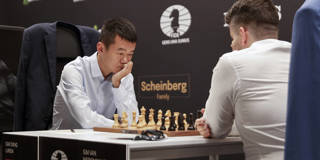The outcome of next year's world championship chess match will likely hinge as much on technological superiority as on individual human ingenuity. Should China’s Ding Liren lose, it will tell us not only something about his opponent’s character but also that Chinese supercomputing is perhaps not as advanced as we think.
CAMBRIDGE – For centuries, chess has been a metaphor for war in myth and in literature. In the next world championship match, which will take place in 2023 between Russia’s Ian Nepomniachtchi and China’s Ding Liren, the comparison may be more apt than ever, with the outcome likely to be decided as much by superiority in multipurpose supercomputing as by individual human ingenuity in chess. And while the Russian military’s dismal early performance in Ukraine hardly suggests an ability to benefit from artificial intelligence in warfare, China is the real deal on that front.
The match between “Nepo” and “Ding,” as the chess world calls them, has arisen because the world number one and defending champion, Magnus Carlsen of Norway, has decided that, having won the world title five times since 2013 (not always easily), he is ready to step down at age 31. (Nepo is 32, and Ding is 29.)
Nepo, who, like many Russian athletes, must forgo the Russian flag to compete internationally, has spoken out clearly against the Ukraine war, and was one of 44 leading Russian chess players who signed an open letter to President Vladimir Putin in early March. “We are against any military action on the territory of Ukraine and call for an immediate ceasefire and a peaceful decision to the conflict through the path of dialogue and diplomatic negotiations,” they wrote. “For us, it is unbearably painful to see the catastrophe that is happening these days with our people.”

CAMBRIDGE – For centuries, chess has been a metaphor for war in myth and in literature. In the next world championship match, which will take place in 2023 between Russia’s Ian Nepomniachtchi and China’s Ding Liren, the comparison may be more apt than ever, with the outcome likely to be decided as much by superiority in multipurpose supercomputing as by individual human ingenuity in chess. And while the Russian military’s dismal early performance in Ukraine hardly suggests an ability to benefit from artificial intelligence in warfare, China is the real deal on that front.
The match between “Nepo” and “Ding,” as the chess world calls them, has arisen because the world number one and defending champion, Magnus Carlsen of Norway, has decided that, having won the world title five times since 2013 (not always easily), he is ready to step down at age 31. (Nepo is 32, and Ding is 29.)
Nepo, who, like many Russian athletes, must forgo the Russian flag to compete internationally, has spoken out clearly against the Ukraine war, and was one of 44 leading Russian chess players who signed an open letter to President Vladimir Putin in early March. “We are against any military action on the territory of Ukraine and call for an immediate ceasefire and a peaceful decision to the conflict through the path of dialogue and diplomatic negotiations,” they wrote. “For us, it is unbearably painful to see the catastrophe that is happening these days with our people.”